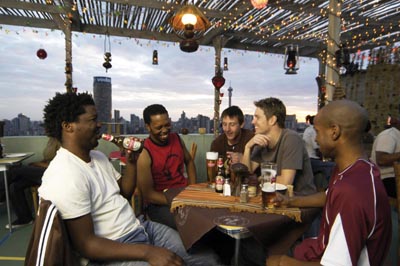Africa
Having enjoyed a beer market monopoly for years, France’s Pierre Castel now faces competition from Heineken which plans to open a brewery in 2008.
Africa
Chelsy Davy, the girlfriend of Britain’s Prince Harry, who was robbed at gunpoint in a Cape Town wine bar in September, may have been the most prominent victim of the latest series of attacks on bars and restaurants.
Africa
The “have-lots” and the “haves”, as Beer SA, the South African beer division of SABMiller, categorises them, have done very well out of the recent strong performance of the economy and have been the force behind the consumer boom, while the
Africa
Portugal’s number one brewer Unicer is to invest EUR 150 million in the construction of a new brewery in the outskirts of the capital Luanda which shall come on-stream in 2008. The former Portuguese colony of Angola with its 13 million inhabitants is Unicer’s largest export market with 60 percent of its beer exports in 2005 being sold there. The brewery will have a production capacity of 700 000 hl in its initial phase, and 1.4 million hl at full capacity...
Africa
The word may have a nasty ring to it. But nothing beats a sound monopoly. In South Africa, where SABMiller enjoys a near monopoly, strong growth in the market for premium beers plus an overall volume growth of 3 percent helped to underpin the 19 percent increase in interim EBITA reported by SABMiller’s local beverages division, SAB.
Africa
It could just be a well-planted rumour to annoy the local bigwig SABMiller that Heineken is considering whether to build a brewery in South Africa, prior to the expiry of a licence for its second brand, Amstel, now held by SABMiller. However, Heineken has every reason to ponder such an option and its officials said recently that a decision was likely before the end of 2006. Heineken that is in bed with Diageo and Namibia Breweries has had its Amstel brand brewed by Namibia Breweries and exported to South Africa since late 2004. Heineken and Diageo have a combined 28.9 percent stake in Namibia Breweries, having taken over InBev’s stake in Namibia’s dominant brewer. ..
Africa
For the financial year ending 31 March 2005, SABMiller’s local division, Beer South Africa, reported a 13 percent increase in turnover and a 20 percent hike in earnings before interest, tax and amortisation (EBITA). A 4 percent increase in overall volumes and a strong 50 percent hike in premium brand volumes helped to generate an impressive increase in EBITA margins to 28.1 percent from 26.6 percent. Graham Mackay, SABMiller’s long-serving CEO, was quoted as saying that the strong local results had benefited from the country’s robust economic performance. According to Mackay, economic and monetary policy had resulted in key economic indicators such as inflation, consumer confidence and growth in gross domestic product (GDP) all moving in the right direction. ...
Africa
True to its well-proven business principles, Heineken will increase its stake in Nigeria’s Consolidated Breweries from 24 percent to a controlling stake of 50.05 percent. At the beginning of December, Heineken N.V. said that it has reached an agreement in principle with a co-shareholder to up its stake. The acquisition will be financed from available cash resources. As agreed by both parties the acquisition price will not be disclosed. The investment will be immediately earnings accretive and value accretive in 2008. The deal is subject to a satisfactory outcome of due diligence and obtaining regulatory approval. Consolidated Breweries was incorporated in 1980. According to Heineken it has a 9.5 million, an EBITDA of EUR15.4 million and an EBIT of EUR13.5 million in 2003..
Africa
SAB, the South African division of SABMiller, has announced a R5 billion capital expenditure plan (EUR650 million) aimed at ensuring it is well placed to take advantage of a strong demand for beer and premium beers in particular. The investment plan, which is to be implemented starting next year, will involve an expenditure of about R1 billion a year for five years. Over 50 percent of this investment will be focused on expanding existing capacity within SAB’s seven breweries. As there are no plans to build new breweries, SAB may even find some cash to spare to invest in some direct-fired kettles for the production of Pilsner Urquell. At present, the group’s capacity enables it to produce 30 million hl of beer a year. In financial 2004, SAB utilised 79 percent of this capacity..
Africa
By all appearances Sierra Leone is no longer the worst place on earth to live. After years of fighting, peace has been restored, following a military intervention by the United Nations and the installation of
a new, democratically elected government. With the things improving, Sierra Leone Brewery Ltd., which was only re-opened in 2001 after being severely damaged during the rebellion in 2000, has decided to re-launch its popular Star beer brand. The brewery, which is located in the capital of Freetown, has also commissioned a new bottling line which is estimated to cost some EUR6 million. Later the permission was granted to brew Guinness Stout and in 1992, a non-alcoholic malt drink, Maltina, was introduced. Currently the brewery is owned by Heineken (42.000 hl..


